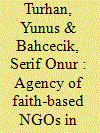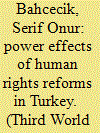| Srl | Item |
| 1 |
ID:
178603


|
|
|
|
|
| Summary/Abstract |
While Turkish faith-based NGOs have been involved in delivering humanitarian aid for two decades, the relations of these organizations with the state have not received adequate scholarly attention. The main purpose of this article is to address this gap by asking what roles NGOs play in Turkey's humanitarian aid policy and practice. Despite the relative isolation of Turkey's administrative structure as a result of a strong state tradition, this paper shows that NGOs attempt to play political roles in Turkish foreign policy. The study relies on an analytical framework derived from constructivism to examine the agenda-setting and information-providing activities of Turkish NGOs between 2004 and 2016. Based on findings from a series of semi-structured interviews with 25 respondents from nine different NGOs and three state institutions, this artilce expands the research agenda on Turkey's foreign aid and shows that NGOs function as knowledge-providers, powerful catalysts for humanitarian aid activities, and influential voices in bringing humanitarian issues to light.
|
|
|
|
|
|
|
|
|
|
|
|
|
|
|
|
| 2 |
ID:
139775


|
|
|
|
|
| Summary/Abstract |
While the perspective of ‘liberalism of fear’ assumes that human rights limit the despotic power of the state, this paper argues that human rights reforms promoted in the context of institution- and capacity-building programmes have had significant power effects by enhancing the disciplinary capacities of the Turkish state and blunting the transformative potential of rights claiming. The reforms increased state surveillance by rechanneling criminal justice processes towards producing evidence (such as telecommunications data, DNA collection, etc) rather than testimonies. Instead of limiting state power, these reforms enhanced the disciplinary mechanisms of social control. They depoliticised the problem of torture by constructing it as an occupational accident (as opposed to a state crime) that happens because of lack of police officer know-how or resources for the investigation of crime. Finally, reforms revamped the way police investigated crimes, rather than launching campaigns against torture and dismissing past wrongdoers in the police. The paper concludes that the neoliberal emphasis on the technicalisation of political problems has limited the democratic potential of human rights reforms.
|
|
|
|
|
|
|
|
|
|
|
|
|
|
|
|